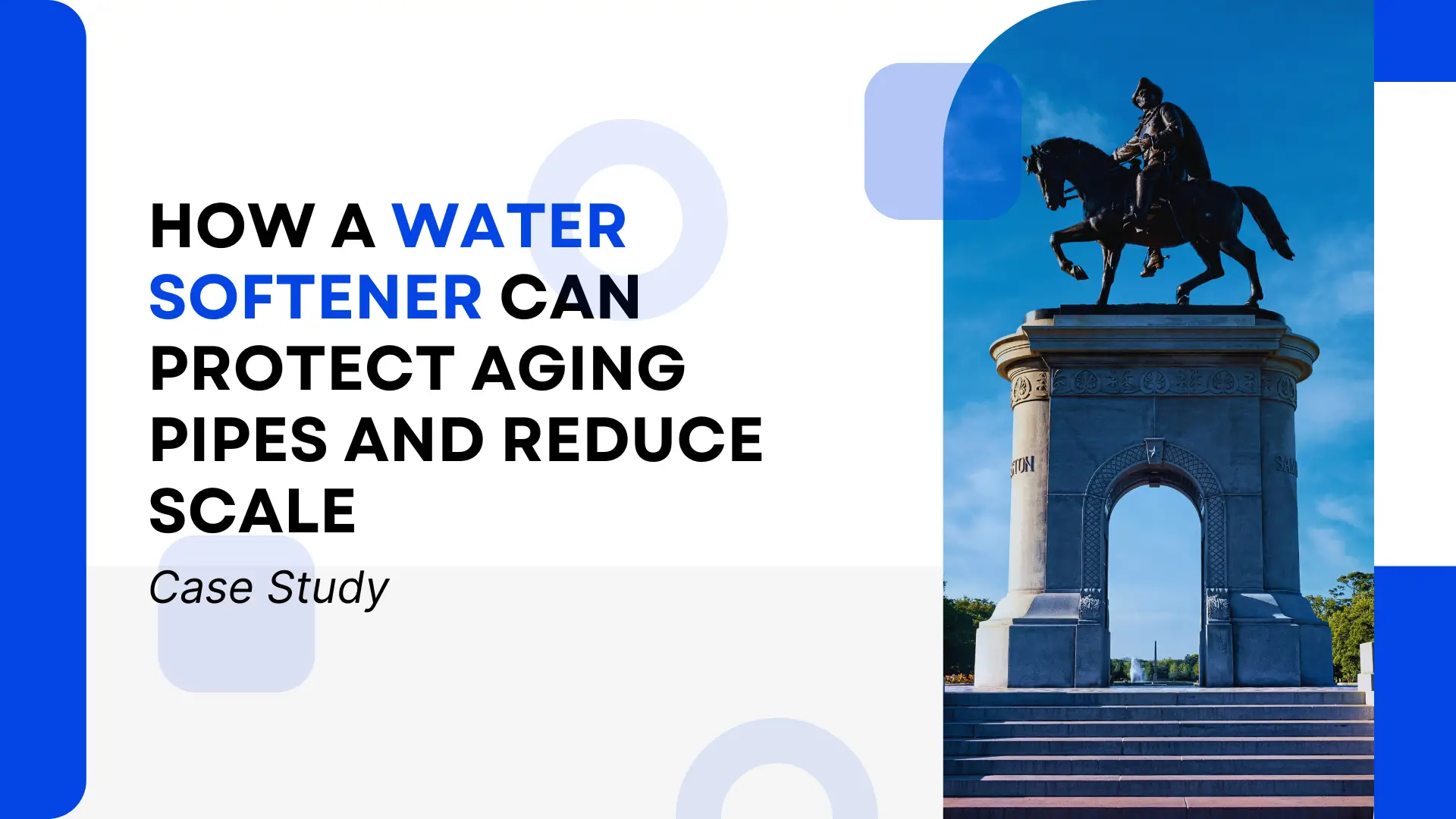Houston homeowners face a unique set of challenges when it comes to their water. From hard water minerals that leave stubborn scale to chlorine and even trace contaminants like PFAS, the water flowing into your home is not always as clean or gentle as you’d like. For families with older plumbing systems or appliances, these contaminants can become costly over time. In this article, we’ll explore how a water softener can protect aging pipes, extend the life of appliances, and improve water quality. We’ll also share a real case study from Houston to show the difference these solutions can make.
Understanding Houston’s Water Challenges
Houston sources its water from both surface water (rivers and reservoirs) and groundwater. While it is treated to meet safety standards, homeowners often report issues with hardness, chlorine levels, and other contaminants. Let’s break down some of the most common concerns.
Hard Water Minerals (Calcium and Magnesium)
- Problem: Houston water is moderately to very hard in many areas. Hardness is caused by calcium and magnesium minerals.
- Impact: These minerals build up inside pipes, water heaters, and fixtures. Over time, this causes scale, clogs, and reduced water pressure. Appliances like dishwashers and washing machines become less efficient and wear out faster.
Chlorine
- Problem: Chlorine is added during municipal treatment to kill bacteria.
- Impact: While effective for disinfection, chlorine can dry out skin and hair, give drinking water a chemical taste, and damage rubber seals in plumbing fixtures.
PFAS (Per- and Polyfluoroalkyl Substances)
- Problem: PFAS are “forever chemicals” linked to health concerns, including hormone disruption and cancer. While levels vary, trace amounts have been found in Texas water sources.
- Impact: PFAS don’t break down naturally. They accumulate in the body and are difficult to filter without specialized systems.
Other Concerns
- Sediment & Rust: Can enter older plumbing systems.
- Iron & Manganese: May stain sinks, tubs, and laundry.
- Taste & Odor Issues: From organic materials or chlorine.
Case Study: Houston Home with Aging Pipes
A Houston family living in a 1970s-era home began noticing low water pressure, cloudy dishware, and frequent water heater repairs. The plumber explained that scale buildup from hard water had narrowed the interior of their copper pipes. Every appliance using water was affected — from the dishwasher to the washing machine.
The family decided to install a whole-home water softener paired with a carbon filtration system. Within three months, they noticed:
- Softer skin and hair after showers.
- No more white film on glasses and dishes.
- Water heater efficiency improved — lower energy bills.
- Plumber inspections showed the pipes were no longer accumulating scale.
This case demonstrates that water softening is not just about comfort. It’s about protecting the integrity of your plumbing system and avoiding costly repairs.
How a Water Softener Protects Your Pipes
A water softener works by replacing hardness minerals (calcium and magnesium) with sodium or potassium ions through a process called ion exchange. Here’s why this matters:
- Prevents Scale: No more mineral buildup inside pipes or appliances.
- Restores Pressure: Older pipes stay open and free of clogs.
- Extends Appliance Life: Water heaters, dishwashers, and washing machines last longer.
- Saves Energy: Appliances run more efficiently without mineral buildup.
- Improves Comfort: Softer water feels better on skin, hair, and laundry.
For Houston residents with aging pipes, a water softener is one of the best defenses against expensive plumbing problems.
How to Test Your Water in Houston
Before investing in a solution, it’s important to understand what’s in your water. Here are some steps:
- Home Test Kits: Available at hardware stores but often limited in scope.
- Professional Testing: A more accurate option that can detect a wider range of contaminants.
- Free Water Test from Aqua Pure: Aqua Pure offers free in-home water testing in Houston so you know exactly what you’re dealing with.
Solutions for Houston Water Problems
Depending on your test results, here are some proven options:
Water Softener
- Best for: Hard water, scale prevention, protecting pipes and appliances.
Carbon Filtration System
- Best for: Removing chlorine, taste, odor, and some organic contaminants.
Reverse Osmosis (RO)
- Best for: Drinking water filtration, removing PFAS, lead, nitrates, and heavy metals.
Whole-House Filtration + Softener Combo
- Best for: Comprehensive protection for both health and home.
Why Houston Families Trust Aqua Pure
At Aquapure, we’ve been helping Houston homeowners for more than a decade with customized water solutions. Here’s why families choose us:
- Free Installation and Support – Certified technicians handle everything from installation to ongoing maintenance.
- Easy Financing – Simple payment plans designed to fit your budget.
- $0 Down Payment, Buy Now – Pay Later – Get the water solution you need with no upfront cost.
- Lifetime Warranty – Our systems are built to last and backed for life.
- Texas Owned, Family Operated – We understand Houston water because we live here too.
- 10+ Years of Trust – Serving Houston families for over a decade.
- Customized Solutions – Every home is unique, so we design systems that fit your exact needs.
Call to Action
If you’re experiencing low pressure, frequent appliance repairs, or scale buildup, don’t wait until your pipes are beyond saving. Protect your home and family with a system tailored to Houston water.
👉 Request a Free Water Test or Quote today and let Aqua Pure show you the difference.
FAQs: Houston Water and Water Softeners
Q1: Is Houston water safe to drink?
Yes, Houston water meets federal safety standards, but many residents prefer additional filtration to improve taste, reduce chlorine, and protect against contaminants like PFAS.
Q2: How hard is Houston water?
Houston’s water ranges from moderately to very hard, with levels typically between 120–200 ppm (parts per million).
Q3: Will a water softener remove chlorine?
No, water softeners remove hardness minerals. To address chlorine, a carbon filter is recommended.
Q4: How often do I need to maintain a water softener?
Most softeners require salt refills every 4–6 weeks. Aqua Pure systems include professional support and lifetime warranty coverage.
Q5: Do older homes in Houston benefit from softeners?
Yes. Aging pipes are more vulnerable to scale and corrosion. A softener can significantly extend the life of your plumbing system.
Q6: Can I finance a water system?
Yes. Aqua Pure offers easy financing, including $0 down payment options and pay-later plans.
Final Thoughts
For Houston families, water quality is more than just taste and convenience — it’s about protecting your investment in your home. Whether you’re fighting scale in aging pipes or just tired of dry skin and cloudy glasses, a water softener paired with the right filtration system can make all the difference.
Visit Aquapure to schedule your free water test and see how we can customize a solution for your home.



